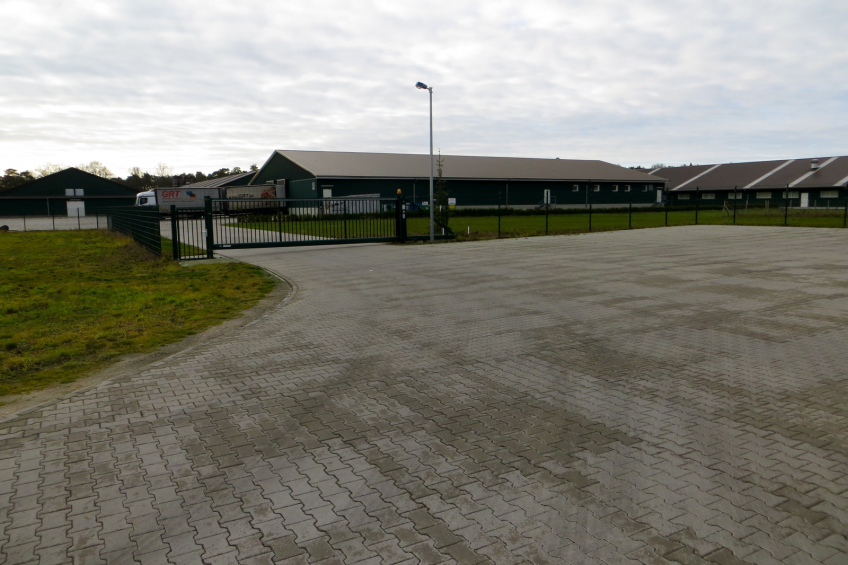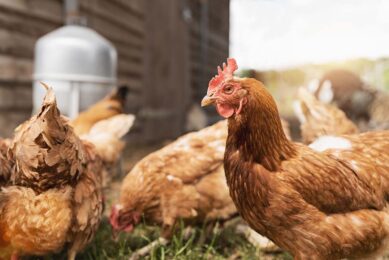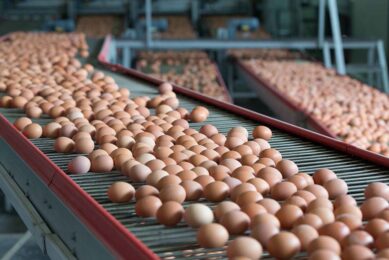Biosecurity on the edge of Berlin

Close to one billion eggs. That`s the annual production of SVB, a gigantic layer site just 30 kilometres southeast of Germany`s capital Berlin. Because the stakes are high, SVB Managing Director Richard Geiselhart has made biosecurity one of the core issues of his company. Here`s how Geiselhart keeps diseases away from his more than 3 million laying hens. (LINK to rest of article online, see below)
“For me, biosecurity basically means protecting our animals against unwanted diseases,” says Geiselhart, who grew up on an egg farm in the south of Germany, but moved to the outskirts of Berlin 5 years ago. “It´s really an issue, since we do not only have to protect our livestock against AI, but against diseases such as IB, IBA, IBQX and salmonella as well.”
We’re sitting in one of the no-frills meeting rooms of SVB, a company with roots in the former communist GDR. “Interestingly, already during the 60’s, when the socialist party founded this company on the outskirts of East Berlin, the management of the farm focused on biosecurity,” Geiselhart says. “Already in those days, each sector of the company was separated from the others and the number of visitors was kept to a minimum.”
When Geiselart took over he first did nothing
After managing egg farms in Poland, Italy and France, Geiselhart was asked to take over the management of the company in 2011. During his first months at SVB, he first did…. “nothing,” he said. Geiselhart: “It is extremely important to first observe how processes inside such a huge company function. After all, we employ nearly 300 persons. One has to find out who are the leaders inside the company, how decisions are being taken, etcetera.”
After his ´observation period´, Geiselhart restructured the company. “It is no secret that 2012 and 2013 were tough years for us. Egg prices were low, fodder prices went up, and some processes didn’t work very well with us,” according to Geiselhart.
Future looks bright for SVB
Things have changed, however. As the end of 2015 approaches, SVB is looking to the future with confidence. “We increased our output annually by 20%. This year we started exporting to the USA as well. We’ve changed from intensive to more extensive production. Sustainability is a big issue for us. We invest hugely in our employees, education is key to our success. We’ve constructed several new breeder houses. We’ve invested in new machinery. We set up our own fodder plant, in order to always know exactly what fodder our hens get. We abstain from genetically modified fodder, we buy our supplies from farmers in the region. Apart from that, we are now making more efficient use of our trucks. Production per employee has increased substantially. We’re producing bio-certified eggs, our relationship with the communities where we are active, is excellent. And we’ve focused a lot on biosecurity, in order to keep diseases away.”
Minimising contact between birds and people is vital
One of the core concepts of biosecurity, according to Geiselhart, is to minimise contact between human beings and the animals. “Nowadays only our own 3 company-owned trucks are allowed to deliver exclusively on our production sites. Actually, not the trucks, but their drivers are the biggest risk. Therefore, we regularly clean the foot mats in the trucks. All our drivers, in fact all of our personnel, have to follow certain biosecurity protocols which we designed exclusively for our company. We also put a lot of focus on hygiene and cleaning standards on our premises. We have clear rules about smoking, eating, wearing jewellery, how to deal with small wounds, bringing in pets, bringing out dead animals, cleaning our machinery, etc.”
A central issue that Geiselhart puts a lot of focus on, is the administration of each visitor. “It sounds very simple and during the initial phase of the company in the 60’s the system functioned as well, but somewhere down the line it was neglected.” Nowadays, registration has been reactivated. The number of workers from outside the farm, such as service personnel, who do maintenance work in the houses, have been reduced.
Last September, during the IEC conference in Berlin, Geiselhart held a presentation about the biosecurity measures on his farm. Originally he planned to invite and show the roughly 400 conference visitors his company, but because of the AI in the USA and Turkey, he decided to abstain from this plan. If visitors do come to the farm, however, naturally they will have to wear overcoats and clean their shoes at door mats at the entrance of the production houses. Before entering, they will have to sign a protocol explaining several visitor’s rules. Visits to other poultry farms during the previous days have to be mentioned. Furthermore, visitors will have to leave their cars on a specially designated parking lot outside the production site.
Not only human contacts should be kept to a minimum, animals such as mice, foxes and birds should be kept outside as well. Therefore, all production sites are surrounded by well maintained and regularly controlled fences.
State-of-the-art poultry breeding houses
Geiselhart takes me to one of the new 80,000 animal-breeding houses of the company, constructed only last year. Signs on the fences surrounding the houses warn people clearly not to enter. “These houses are state-of-the-art,” says Geiselhart proudly. “The roads to the production houses are kept clean, in order not to have the fodder trucks bring in dirt. If necessary, we put cleaning mats on the roads, especially for the trucks at the entrance gates. Furthermore, all fodder is being brought in only by our own transport trucks who connect to the fodder silos outside of the houses. Dead animals are being collected in containers which are then brought to a separated room disconnected from the production houses. This room can be entered by our employees without actually getting onto our terrain. In this way, we also keep contact to a minimum.”
All in all, Geiselhart and his company SVB seem to be on the right track. Still, the Managing Director has more plans for the future. “As we are talking, we are still producing on multi-age farms,” Geiselhart explains. “In an ideal world, we would adapt to single-age production houses. This is one of my plans for the future, but I’m not sure yet whether we will actually turn this dream into a reality. It would cost a lot. But yes, we will continue to optimise the biosecurity level on our farm.”
Join 31,000+ subscribers
Subscribe to our newsletter to stay updated about all the need-to-know content in the poultry sector, three times a week. Beheer
Beheer








 WP Admin
WP Admin  Bewerk bericht
Bewerk bericht